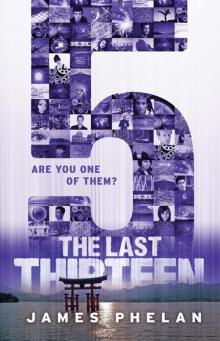- Home
- James Phelan
Red Ice Page 24
Red Ice Read online
Page 24
McCorkell asked, “How could we never have heard of this?”
“We have and we haven’t,” Reagan replied. “There was a transatlantic cable dispute involving Seward in March 1867 when the Russian Minister to the US sent an encrypted 1,833-word cable to St Petersburg. The cable was transmitted through the newly organised State Department telegraph office at a cost of about ten grand—a lot of cheddar for back then. The cable contained the basic treaty conditions for the purchase of Russian America for seven million dollars and was sent, according to the Russian Minister, at the request of Seward, who he asserted would pay for it. The charges for the cable were then transferred to the American account—for the State Department to pick up the tab, which by then had tripled. Anyway, I’m rambling. Where was I?”
Bill looked to Valerie.
“A Russian cable…”
“Yeah. It was intercepted—the telegraph company … A few years later, we broke the Russian code and it was translated. It mentioned a protocol had been drawn up should the need arise to impose pressure on the Americans to pay up.”
“So…”
“So, yeah, this protocol is looking more and more legit. Seward and Stoeckl were close friends, they obviously knew how to keep a secret,” Reagan said. “From what you’ve told me and what I know about the treaty itself, I’d say that this protocol was made to appease the Tsar should Stoeckl have to appear before him and explain why the Americans were not paying for Alaska.”
“Because the Senate wouldn’t agree to the purchase?” Valerie asked.
“House of Reps held up payment,” Reagan said. “The date on your image of the protocol puts it about six months into that stalemate.”
“It eventually took them a year or so to pony up with the cash,” McCorkell said. “Russians were getting cold feet … Might have pulled out and sold it to the French or English.”
“Or worse, kept it,” Reagan said. “Would have made the Cold War a little different.”
Bowden asked, “And you’re telling us—you think this would be legal today?”
“I’d say so. You rescind on this…”
“Yeah, all of a sudden every treaty we’ve signed falls to shit,” McCorkell said, looking at Bowden closely. “Makes this worth killing for, wouldn’t you say?”
“Hell,” Reagan said. “We turn our back on this, maybe the French would come back and say, ‘Hang on, you know how we sold you about half your country in the Louisiana Purchase, that agreement ain’t worth shit anymore.’”
“I know a few people in DoD who’d love to see the French try and take it back,” McCorkell said.
Bowden asked, “Why didn’t the Congress know about this protocol at the time?”
“Didn’t have to go before them, because it didn’t involve any additional payment,” Reagan explained. “It was a state agreement, no money changed hands.”
“An agreement between a couple of friends…” Bowden said, the cogs turning with this new complication.
“Jesus…” Valerie said. “Makes you wonder what else we don’t know about.”
“What about Seward?” Bowden asked. “Could we argue Seward was not of sound mind?”
“Right,” Valerie said, thinking it through. “Lewis Powell, the associate of John Wilkes Booth, attempted to assassinate Seward, the same night Abraham Lincoln was shot.”
“He was badly injured,” McCorkell added, remembering.
“That won’t fly,” Reagan said, resolute. “He was sound, smart, a good operator, hell of a guy.”
“Just a thought,” Bowden said. “So where’s it leave us?”
“Under international law,” Reagan said, “no country currently owns the North Pole or the region of the Arctic Ocean surrounding it.”
“That might change, too.”
“The five surrounding Arctic states—us, Russia, Canada, Norway and Denmark—are limited to a two-hundred-nauticalmile economic zone around our coasts, and we each administer corresponding regions to the pole. Think of it as a giant pie chart.”
“And what—this means that our two-hundred-mile sea limit will disappear?”
“That and more,” she said. “Upon ratification of the United Nations Convention on the Law of the Sea, each country had a ten-year period to make claims to extend its two-hundrednautical- mile zone. Russia ratified in 1997—”
“Matches with their Arktika date in 2007,” Valerie said.
“Coincidence, huh? They went and planted their flag down there on the seabed, on their claimed limit of the continental shelf.”
Bowden asked, “When did we ratify?”
“We haven’t,” Reagan replied. “The United States has signed, but not yet ratified the treaty.”
“Where’s it at now?”
“Does it matter? That won’t stop this thing.” She looked exasperated. “Look, as it stands the status of the Arctic Sea region is in dispute. While Canada, Denmark, Russia and Norway all regard parts of the Arctic seas as ‘national waters’ or ‘internal waters,’ the United States and most European Union countries officially regard the whole region as ‘international waters.’”
“So Russia has been claiming a larger slice extending as far as the North Pole,” Bowden said, “laying stake to future oil and gas finds on the seabed because Moscow believes the Arctic seabed and Siberia are linked by one continental shelf—”
“And now they will own our sector, too,” McCorkell finished for him. Bowden nodded.
“The Ilulissat Declaration was announced in May 2008 by the five Arctic circumpolar nations during the Arctic Ocean Conference in Greenland,” Reagan said. “One of the chief goals written into the declaration was blockage of any ‘new comprehensive international legal regime to govern the Arctic Ocean.’ An additional pledge for the ‘orderly settlement of any possible overlapping claims’ was expected.”
“So…” Bowden prompted.
“If this protocol is presented, Alaska will be surrounded by Russian-controlled water,” Reagan said. “They’ll be in the driving seat—we’ll no longer have a voice at the table in talks about the Arctic region. And you can forget a nuclear warning window for them, and any kind of missile shield—I mean, they’ll now be in rifle range. Got any friends in Alaska? Tell them it’s time to sell up.”
“Yeah, we got that,” McCorkell said. “Not to mention we lose hundreds of billions of dollars in future oil and gas revenues.”
“Minerals too,” Valerie said. “And the unfathomable cost to the Arctic wildlife and global climate change should they decide to make the Arctic seabed an industrial zone.”
“And transit routes, if they want to play tough,” Reagan said, the full consequences setting in. “Our best hope is to get this protocol—before the Russians take it to the UN or the Hague or some place.”
“Yeah, we’re working on that, Reagan. Thanks for your time,” McCorkell said. “We’ll be in touch.”
86
HIGH OVER CHINA
“We touch down in Shanghai in thirty minutes,” the pilot announced over the cabin speakers. “Easing out of super-cruise, hope you enjoyed your travel at Mach 2.”
Next to Fox, Kate’s skin was glowing.
Gammaldi stretched out in his chair, yawned himself awake. Zoe had been up for the last few minutes, drinking a juice and working on her BlackBerry.
“My boss, the Interior Minister, has given me an ultimatum,” she said, looking up from her email. “Deliver the goods or … you and I, Lachlan, are … What is the English way to explain it…”
“Fucked,” Fox said. “When in doubt, stick with the French.”
Zoe almost laughed.
“We’ll get your guy,” Fox said.
“Yeah.” Gammaldi stood up, stretched and shook his arms and legs. “Meantime, us kids will be someplace else, no doubt. Don’t know about you, Kate, but an all-you-can-eat Chinese buffet would hit the spot.”
Fox pulled out the laptop and hoo
ked it up; in a couple of minutes they had Skyped McCorkell.
“So the protocol points out what would happen if the payments were dragged out even further,” Fox said after hearing the latest. “Reparations and fines. So what, the US paid up, right?”
“We’ve had someome from the State Department just run us through it,” McCorkell replied. “There’s one point that’s still relevant today.”
“What?” Fox asked.
“The sea boundary thing, reverting back to the antiquated three-mile limits.”
“It states just how—” Fox cut himself off. “Jesus … the wording.”
“I know,” McCorkell replied. “It states that if presented, this protocol is binding for perpetuity—there’s no time clause on it, no time constraint.”
“And this was made up between two men as a ‘just in case’ wild card…” Fox said.
“If they present this, it would be accepted as international law and Russia would own all the water in the Arctic that we currently claim as sovereign to the US.”
Gammaldi added, “No more Exclusive Economic Zone…”
“It all links in to what they’ve been doing lately,” Fox said. “Their Arktika expeditions, claiming the under-seabed as their own while the world laughed at them, but in a way we were all wondering what if?”
“What’s this Arktika expedition?” Gammaldi asked.
“In 1997 a UN treaty was signed, updating water rights,” McCorkell explained. “It gave everyone ten years to make any claims. In June 2007, a group of Russian geologists returned from a six-week voyage on a nuclear icebreaker. They had travelled to the Lomonosov Ridge, an underwater shelf in Russia’s remote and inhospitable eastern Arctic Ocean, and they claimed a vast expanse of area. We’ve been contesting it since, but this protocol will negate that argument and then some … We’d be handing it to them on a silver platter.”
“So if they get this out, if they can claim all that territory and resource wealth?” Fox asked, looking at the faces around him.
“America will be complicit in whatever the Russians decide to do with it,” Kate said.
“Unless…” Fox began.
“Unless what?”
“I don’t know—nothing…”
“As Al said, no more US exclusive economic zone of two hundred miles from shore,” McCorkell said. “And sure as hell no continental shelf boundary issues—it’s practically theirs now, this says we agreed to it over a century ago.”
“So you’re saying current US Arctic waters, under this treaty, would revert back to the old three miles from shore distance?” Gammaldi asked.
“The Russians have claim to all that the US currently stakes as ours,” McCorkell said. “They’d own the vast majority of the territory, with Canada, Denmark and Norway each with a little slice of pie…”
Fox thought about it: Umbra Corp, Babich’s ‘legitimate’ group of businesses had been a major backer of that Arktika expedition. But how would this help Babich get to power in his country? That had long been his end-game … The current Russian government had decided to go to war against the man—but, maybe, if the population were behind Babich … Would that be enough? No, it wasn’t right—there was something else; had to be.
Gammaldi still couldn’t quite get his head around the importance of it.
“They could open up the Arctic for resource extraction,” Fox said. “Use it all, do what they want—the US could no longer block them in the UN because they would no longer have a stake in that area.”
“But who, Babich’s companies? He’s going to trial for all kinds of—”
“He’s going to use this,” Fox said, the threads coming together. “It’s his get-out-of-jail-free card. What if he hands this to the Russian government in exchange for amnesty?”
“Maybe…” McCorkell replied. “Thing is, what would they do with it?”
“That’s what I was trying to think of before,” Fox said. “I mean—they could decide not to enact this, swap it, put an end to the US missile shield or something. It’s the mother of all bargaining chips.”
“Whatever they did, you could bet your ass it would cost us,” McCorkell said.
“If he presents this and it works,” Gammaldi said, almost to himself, “he’ll be popular to Russians, Europe and China, too; whoever wants to buy his resources—hell of a lot of fossil fuel under there.”
“And he’s already hugely popular in Russia because of all the work his companies have created, and he’s seen as a different breed of oligarch,” Fox said. “This has all been carefully orchestrated—he’s been building himself up for years as a statesman, keeping out of party politics.”
“But how will he leverage power from the current guys in office?” McCorkell asked. “They’re a tight ship, no one else gets a look-in during elections in Russia.”
“You think he’ll use this to seize power?” Fox asked, shaking his head. “That’s what doesn’t add up. There’s gotta be something else.”
“Fasten your belts, beginning our descent,” the pilot said over the PA.
“We gotta sign off,” Fox said.
“Hutchinson will meet you at the hotel,” McCorkell said. “Good luck.”
They ended the connection.
“I think you’re missing something,” Zoe said as they each buckled in. “Perhaps he would stage a coup, like they did when Yeltsin—”
“He may not need to,” Fox said. “He may already have the numbers he needs in the houses of government, not to mention the military and intel communities, to transition the government out. If he can somehow drive a wedge in there, get enough to denounce the current regime…”
“He’s got his own media,” Gammaldi said. “He’s got the money—and now he’s got this secret protocol.”
“If this is legal,” Zoe said. “Maybe it’s—”
“It’s legal,” Kate said. “I worked for a legal department in the government—”
“I know your background,” Zoe interjected.
Kate let fly, “If you renege on a standing international treaty,” she said loudly, “especially such a massive one like this, your standing in the world, especially as a world leader, is questioned, diminished, and then lost. The US can do nothing if he presents this document to the world. Worst case, Russia could use their military to enforce the treaty terms.”
“Maybe this is the end of the US as a world leader,” Zoe said.
“Or the start of Roman Babich’s Russia as one,” Fox concluded.
87
EAST CHINA SEA
“Relax,” Jinks told Hutchinson as they approached the USS George Washington. Yeah right, Hutchinson thought, looking out below. Not much but a few tiny lights on a dark sea. The George Washington was a Nimitz Class aircraft carrier, something that conjured impressive size in his mind. From here it looked like a fucking postage stamp that grew to a Post-it note and was still only the size of a napkin as they made their final approach. Relax, the flight deck’s 4.5 acres of prime runway real estate, the commander had said, like it was a reassuring fact. Hutchinson closed his eyes for the final ten seconds.
The force of the landing, and then the sudden jerk of the tail hook catching the arrestor cable, pulled a pitiful sound out of him.
“Good job,” Jinks said, maybe to himself.
They came to a stop and the aircraft powered down. Hutchinson reached over his shoulder and the pilot shook his hand.
“Thanks, Commander.”
“Pleasure Andy; that was a sweet flight, if I do say so myself.”
Really? Hutchinson felt like he’d left his eyeballs back over Turkey when they’d refuelled in mid-air and then waved goodbye to the tanker and punched through the sound barrier. He’d be happy if he never rode in another aeroplane as long as he lived.
“Watch your legs, they’re gonna feel like jelly,” Jinks said.
He wasn’t kidding. It took everything Hutchinson had to hobble down
to the USS George Washington’s flight deck and stand shakily upright, even with guys helping him.
The two white-shirted crew members took Hutchinson under the arms and virtually carried him over to the island, the aircraft carrier’s apartment-block-sized command area. Carriers were old school, Hutchinson thought, but, damn, if they weren’t awesome, and they were indispensable to the nation: whenever there was shit brewing abroad, those in Washington would say, “Where’s the nearest carrier?” The USS George Washington’s island number was outlined in red, white and blue lights in honour of her namesake’s contributions to America’s independence. The whiteshirts, both hospital corps men, asked him about his leg wound and offered a wheelchair; he opted for crutches and wanted to get off the flight deck, fast.
A guy in a suit came out of the island structure and introduced himself as an agent from the Shanghai consulate’s Legal Attaché office.
“Special Agent Hutchinson, I’m taking you by helo to the New York,” he said, one of a growing number of Chinese–Americans on the Bureau’s payroll. “Follow me.”
“What’s the New York?” Hutchinson asked, making his way across the flight deck towards a Seahawk, its rotor already whirring.
“That there, Sir,” he pointed out to the sea. A big grey Navy ship sat a couple of miles out, angular and square compared to the others around, mostly Arleigh Burke class destroyers.
“We’ll touch down on her momentarily,” the Legat said. “Got our HQ set up real good.”
Hutchinson was helped into the helo. It was spacious and slow compared to his last ride but, all the same, he’d give anything to be on dry land.
88
SHANGHAI
“Landing momentarily,” Gammaldi leaned in closer to Fox across the aisle. “Seriously, do you think we could stop for some Chinese on the way into town?”
Fox just shook his head and watched the vast blanket of lights that hugged China’s coast from his window. He felt a sense of dread, but he pushed it away. This would be over soon. He looked at Kate and thought of the endless possibilities ahead. What would Hutchinson have in mind for Babich now? Fox knew what he wanted to do.

 10
10 3
3 Survivor
Survivor 6
6 The Hunted
The Hunted Quarantine
Quarantine 11
11 The Last Thirteen - 1
The Last Thirteen - 1 Fox Hunt
Fox Hunt 9
9 7
7 Patriot Act
Patriot Act 2
2 Blood Oil
Blood Oil Red Ice
Red Ice Chasers
Chasers Liquid Gold
Liquid Gold 8
8 5
5 The Spy
The Spy Kill Switch
Kill Switch Dark Heart
Dark Heart